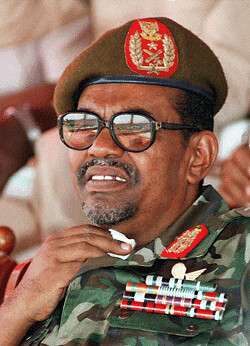
Sudan President Omar Hassan al-Bashir has gained the support from many African and Arab states in light of the International Criminal Court indictment against him. He has dismissed the charges as an imperialist plot to seize the oil wealth of Sudan., a photo by Pan-African News Wire File Photos on Flickr.
Sudan shaken up by new gov't changes as regime opponents press on for reform
Khartoum, Saturday 7 Dec 2013
The resignation of one of the stalwarts of the Bashir regime in Sudan last week could indicate deeper and broader changes ahead, or simply a cosmetic reshuffling of the current regime
After Omar Al-Bashir’s Revolutionary Command Council for National Salvation (RCC) came to power in 1989, Sudan has not undergone political travails over the past 25 years as difficult as the ones it is experiencing now.
Based on a key demand on the Sudanese street, however, many believe that change will come in the form of a regime shakeup, one that would get rid of the old guard and the ruling party.
One of the first and foremost indications of such change was the stepping down of First Vice President Ali Osamn Taha, the second man in command and a staunch figure in Bashir’s regime, last week.
Taha engineered the Naivasha Agreement that ended years of civil war between North and South Sudan, and ultimately led to their partition.
And although details around Taha’s sudden exit were not fully disclosed, he himself revealed that he had left without dispute or disagreement with the government, believing himself to be a proponent of the batch of changes promised by Al-Bashir in 2011.
Sudanese opposition and activists, nonetheless, do not view Taha’s stepping down as real change.They cite the possibility of his return in the 2015 elections as a presidential hopeful and political heir to Al-Bashir, who declared he did not want to run himself.
However, an editor-in-chief of one of the prominent local papers said in a special interview that the "time for Taha to become president has passed; he is paying the price of the peace agreement."
"I find it hard to believe that he would be Bashir’s successor according to the balance of power in the country at this point," he continued.
In that vein, prominent National Congress Party (NCP) leader Mahgoub Abdel Salam told Ahram Online: "The in-place programme aimed to salvage the country has undergone several changes since 1989."
"But an impending change is behind the current panic; some faces are fixed, and do not change, including Abdel Rahim Hussein, who worked between the presidential office and the interior ministry."
Others were reshuffled only to hold posts in other ministries. "Those have remained in power for 24 years, representing the face of the salvationist government — such as Taha when adopting the slogan of unity between the Islamists and the military."
"Even though the absence of Taha from the political stage is hard to believe, if proven true it would entail a kind of transformation and could usher in a new era."
Taha's safe exit paves the way for a successor, one who many believe was being long groomed for the position. Minister of Presidential Affairs General Bakri Hassan was an agreed-upon candidate within the ranks of the NCP, and even nominated by Taha himself.
Hassan is the last remaining officer from the RCC, which was formed by 15 officers who staged a coup d’etat in the late 1980s. Besides that, he is Bashir’s close confidante and former fellow paratrooper, seen also as the guardian of the command council.
Whether evident consensus over Hassan is a mark of a peaceful transition of power in Sudan is up for question. However, a high profile source confirmed that Bashir "did not trust any other military man but Hassan."
A criticism pointed at the current scenario is that changes are being made from within the palace, not outside it. Other considerations must also be taken into account, which might tip the power balance.
A recent division within the ruling party has shaken up those in power, set off by the resignation of Deputy President Ghazi Salah Eddin following the crackdown on peaceful protests in September, and which led to the deaths of over 100 people, according to Amnesty International reports.
The anti-government protests fretted the regime, as many observers claimed in interview with Ahram Online, particularly because the regime employed Janjaweed mercenaries — the same used in Darfur — and did not resort to its usual forces.
In the midst of protests, more than 30 of its top members presented a memo to the president criticising the government's decision to remove subsidies on fuel and other basic commodities, saying it "harshly" impacted Sudanese citizens.
Another consideration to be made is the upsurge of reform movements and oppositional coalitions such the Reform Now Party, initiated by Salah Eddin.Others formed anti-government campaigns, such as "We’re Fed Up" and "Change Now."
Eddin, for one, believes his party will play a huge role in future politics in Sudan. He also thinks that the Sudanese tribes are another player that cannot be neglected, and whom, like Islamist powers, would refuse any hint of a power vacuum in Sudan.
Such changes come in the wake of difficult economic conditions, especially as the inflation rate reached 45 percent in October 2013, according to official figures, while fuel prices are expected to spike by 90 percent.
What has led to the further deterioration of the situation is the refusal of Gulf States and neighbouring African countries to provide financial support for the current government to help it out of the crisis.
http://english.ahram.org.eg/News/88502.aspx
No comments:
Post a Comment